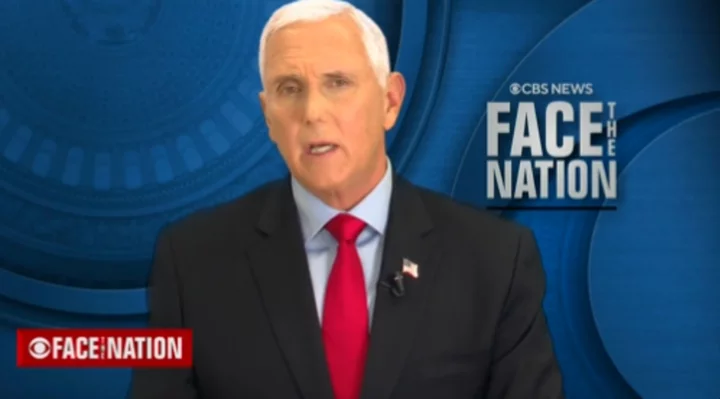
Pence ‘doesn’t believe’ racial inequality exists in schools as he celebrates SCOTUS affirmative action ban
Mike Pence cheered the end of affirmative action in US colleges and universities on Sunday in the wake of the Supreme Court’s ruling outlawing the practice. The former vice president discussed the issue on CBS’s Face the Nation and said that the time for policies aimed at improving outcomes for minority students in general had passed. A candidate for the presidency in 2024, Mr Pence is gunning for the GOP nomination against his own former boss, Donald Trump, and other conservatives like Florida Gov Ron DeSantis and former UN Ambassador Nikki Haley. His comments came as activists and authorities in the higher education field vowed to keep fighting to ensure that diversity would remain a core value in student recruiting. “Fundamentally, do you believe that there are racial inequities in the education system in the United States?” asked host Margaret Brennan. “I really don’t believe there is [racial inequality in US schools]. I believe there was,” Mr Pence said. “I mean, it’s — there may have been a time when affirmative action was necessary simply to open the doors of all of our schools and universities, but I think that time has passed.” His response drew immediate backlash on Twitter, with many questioning whether Mr Pence’s children had attended schools and colleges with diverse student bodies. The three Pence children, Michael, Charlotte and Audrey, attended Purdue, DePaul, and Yale Universities. The Supreme Court ruled on Thursday that universities and colleges may not consider race as a specific factor when choosing to admit individual students. They may, however, continue to take into account how race plays into the individual experiences that those prospective students describe in their applications, such as in personal essay prompts. “[T]he student must be treated based on his or her experiences as an individual—not on the basis of race,” wrote Chief Justice John Roberts for the majority. The suit was brought on behalf of a group of Asian American students who argued that they were discriminated against by admissions staff at Harvard University. Critics of the ruling say it will gut efforts to improve representation of minority students in college classes. College enrollment rates remain noticeably lower among Black and Hispanic students compared to white and Asian American students. In addition, an analysis of US education data has shown that about 40 per cent of Black children attend schools where 90 per cent or more of the students are nonwhite. President Joe Biden responded to the ruling on Thursday after news of the decision broke, telling reporters simply: “This is not a normal court.” Read More Biden reveals ‘new path’ to student debt relief after Supreme Court strikes down president’s plan The Supreme Court risks inflaming the prejudices that America sought to banish In 370 days, Supreme Court conservatives dash decades of abortion and affirmative action precedents Mike Pence claims Biden is rehabilitating the Iran nuclear deal Trump returns to campaign rallies, draws thousands to small South Carolina city ahead of July 4 Biden blames GOP for student loan ruling as 2024 political consequences loom
2023-07-03 05:27
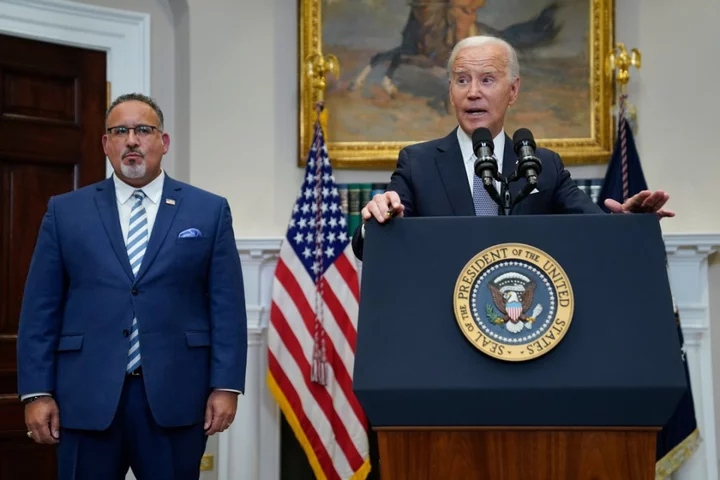
Biden reveals ‘new path’ to student debt relief after Supreme Court strikes down president’s plan
After the US Supreme Court struck down his administration’s plan to cancel federal student loan debts for millions of Americans, President Joe Biden has unveiled a “new path” for relief, one that he assured is “legally sound” but will “take longer”. In remarks from the White House on 30 June, the president hit out at Republican state officials and legislators who supported the lawsuit which enabled the nation’s highest court to strike down his student debt forgiveness initiative, accusing many of them of hypocrisy for taking money from pandemic-era relief programs while opposing relatively meager relief for student loan borrowers. “Some of the same elected Republicans, members of Congress who strongly opposed relief for students, got hundreds of thousands of dollars themselves ... several members of Congress got over a million dollars — all those loans are forgiven,” he said. “The hypocrisy is stunning,” he said. Accompanied by Secretary of Education Miguel Cardona, Mr Biden opened his remarks by acknowledging that there are likely “millions of Americans” who now “feel disappointed and discouraged or even a little bit angry about the court’s decision today on student debt”. “And I must admit, I do too,” he said. Still, Mr Biden reminded Americans that his administration has previously taken actions to reform student loan repayment programs to make them easier to access, and to keep borrowers from spending more than five per cent of disposable income on monthly repayments, and to strengthen loan forgiveness options for borrowers who take public service jobs. The president has directed Mr Cardona to “find a new way” to grant similar loan relief “as fast as we can” in a way that is “consistent” with the high court’s decision. On Friday, the Education Department issued the first step in the process of issuing new regulations under this so-called “negotiated rulemaking” process. In the mean time, Mr Biden said his administration is creating a temporary year-long “on-ramp repayment programme” under which conditions will remain largely the same as they have during the three-year pandemic-era pause in payments which is set to expire this fall. The department’s 12-month “on ramp” to begin repayments, from 1 October through 30 September, aims to prevent borrowers who miss repayments in that time period from delinquency, credit issues, default and referral to debt collection agencies. “During this period if you can pay your monthly bills you should, but if you cannot, if you miss payments, this on-ramp temporarily removes the threat of default,” he said. “Today’s decision closed one path. Now we’re going to pursue another — I’m never gonna stop fighting,” the president continued, adding that he will use “every tool” at his disposal to get Americans the student debt relief they need so they can “reach [their] dreams”. “It’s good for the economy. It’s good for the country. It’s gonna be good for you,” he said. Asked by reporters whether he’d given borrowers false hope by initiating the now-doomed forgiveness plan last year, Mr Biden angrily chided the GOP for having acted to take away the path to debt relief for millions. “I didn’t give any false hope. The question was whether or not I would do even more than was requested. What I did I felt was appropriate and was able to be done and would get done. I didn’t give borrowers false hope. But the Republicans snatched away the hope that they were given and it’s real, real hope,” he said. The Supreme Court’s 6-3 ruling from the conservative majority argues that the president does not have the authority to implement sweeping relief, and that Congress never authorised the administration to do so. Under the plan unveiled by the Biden administration last year, millions of people who took out federally backed student loans would be eligible for up to $20,000 in relief. Borrowers earning up to $125,000, or $250,000 for married couples, would be eligible for up to $10,000 of their federal student loans to be wiped out. Those borrowers would be eligible to receive up to $20,000 in relief if they received Pell grants. Roughly 43 million federal student loan borrowers would be eligible for that relief, including 20 million people who stand to have their debts cancelled completely, according to the White House. Lawyers for the Biden administration contended that he has the authority to broadly cancel student loan debt under the Higher Education Relief Opportunities for Students Act of 2003, which allows the secretary of education to waive or modify loan provisions following a national emergency – in this case, Covid-19. Since March 2020, with congressional passage of the Cares Act, monthly payments on student loan debt have been frozen with interest rates set at zero per cent. That pandemic-era moratorium, first enacted under Donald Trump and extended several times, was paused a final time late last year. Over the last decade, the student loan debt crisis has exploded to a balance of nearly $2 trillion, most of which is wrapped up in federal loans. The amount of debt taken out to support student loans for higher education costs has surged alongside growing tuition costs, increased private university enrollment, stagnant wages and GOP-led governments stripping investments in higher education and aid, putting the burden of college costs largely on students and their families. Read More Supreme Court strikes down Biden’s plan to cancel student loan debts Supreme Court strikes down affirmative action, banning colleges from factoring race in admissions Biden condemns Supreme Court striking down affirmative action: ‘This is not a normal court’ Justice Ketanji Brown Jackson delivers searing civil rights lesson in dissent to affirmative action ruling
2023-07-01 04:47
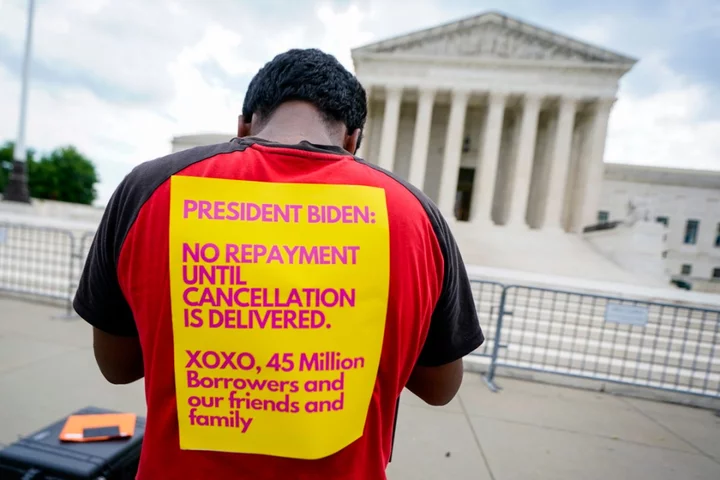
Supreme Court strikes down Biden’s plan to cancel student loan debts
The US Supreme Court has struck down President Joe Biden’s plan to cancel student loan debts for millions of Americans, reversing his campaign-trail promise as borrowers prepare to resume payments this summer. Chief Justice John Roberts delivered the 6-3 decision from the court’s conservative majority. The ruling, which stems from a pair of cases challenging the Biden administration and the US Department of Education, argues that the president does not have authority to implement sweeping relief, and that Congress never authorised the administration to do so. Within 30 minutes on the last day of its term, the court upended protections for LGBT+ people and blocked the president from a long-held promise to cancel student loan balances amid a ballooning debt crisis impacting millions of Americans. Under the plan unveiled last year, millions of people who took out federally backed student loans would be eligible for up to $20,000 in relief. Borrowers earning up to $125,000, or $250,000 for married couples, would be eligible for up to $10,000 of their federal student loans to be wiped out. Those borrowers would be eligible to receive up to $20,000 in relief if they received Pell grants. Roughly 43 million federal student loan borrowers would be eligible for that relief, including 20 million people who stand to have their debts canceled completely, according to the White House. Roughly 16 million already submitted their applications and received approval for debt cancellation last year, according to the Biden administration. The long-anticipated plan for debt cancellation was met almost immediately with litigation threats from conservative legal groups and Republican officials, arguing that the executive branch does not have authority to broadly cancel such debt. Six GOP-led states sued the Biden administration to stop the plan altogether, and a federal appeals court temporarily blocked any such relief as the legal challenges played out. Since March 2020, with congressional passage of the Cares Act, monthly payments on student loan debt have been frozen with interest rates set at zero per cent. That Covid-19-pandemic era moratorium, first enacted under Donald Trump and extended several times, was paused a final time late last year – until the Education Department is allowed to cancel debts under the Biden plan, or until the litigation is resolved, but no later than 30 June. Payments would then resume 60 days later. The amount of debt taken out to support student loans for higher education costs has surged within the last decade, alongside growing tuition costs, increased private university enrollment, stagnant wages and GOP-led governments stripping investments in higher education and aid, putting the burden of college costs largely on students and their families. The crisis has exploded to a total balance of nearly $2 trillion, mostly wrapped up in federal loans. Millions of Americans also continue to tackle accrued interest without being able to chip away at their principal balances, even years after graduating, or have been forced to leave their colleges or universities without obtaining a degree at all while still facing loan repayments. Borrowers also have been trapped by predatory lending schemes with for-profit institutions and sky-high interest rates that have made it impossible for many borrowers to make any progress toward paying off their debt, with interest adding to balances that exceed the original loan. One analysis from the Education Department found that nearly 90 per cent of student loan relief would support people earning less than $75,000 per year. The median income of households with student loan balances is $76,400, while 7 per cent of borrowers are below the poverty line. That debt burden also falls disproportionately on Black borrowers and women. Black college graduates have an average of $52,000 in student loan debt and owe an average of $25,000 more than white graduates, according to the Education Data Initiative. Four years after graduating, Black student loan borrowers owe an average of 188 per cent more than white graduates. Women borrowers hold roughly two-thirds of all student loan debt, according to the American Association of University Women. Mr Biden’s announcement fulfilled a campaign-trail pledge to wipe out $10,000 in student loan debt per borrower if elected, though debt relief advocates and progressive lawmakers have urged him to cancel all debts and reject means-testing barriers in broad relief measures. In November 2020, the president called on Congress to “immediately” provide some relief for millions of borrowers saddled by growing debt. “[Student debt is] holding people up,” he said at the time. “They’re in real trouble. They’re having to make choices between paying their student loan and paying the rent.” This is a developing story Read More Supreme Court allows Colorado designer to deny LGBT+ customers in ruling on last day of Pride Month Biden condemns Supreme Court striking down affirmative action: ‘This is not a normal court’ Justice Ketanji Brown Jackson delivers searing civil rights lesson in dissent to affirmative action ruling
2023-06-30 23:16

Melania Trump hawks $50 NFTs to ‘celebrate our great nation’ ahead of July 4
Melania Trump is launching a collection of $50 non-fungible tokens (NFTs) featuring US landmarks in time for the 4th of July. The former first lady’s “1776 Collection” includes images of Mount Rushmore, the Statue of Liberty and the Liberty Bell, set to patriotic-themed music. Ms Trump’s office said in a statement that each NFT was designed to celebrate the “foundations of American ideals”. “The 1776 Collection of artwork draws inspiration from several iconic landmarks of our nation, which I had the privilege of visiting during the time I served as first lady,” Ms Trump said. “I am proud to celebrate our great nation and remain inspired by the words contained within the Declaration of Independence.” An NFT is a blockchain-based certificate verifying ownership. The 1776 Collection was created on the Solana blockchain, and went on sale on Thursday. Ms Trump’s office said a portion of the sale price would go to support foster children. The site did not immediately respond to a request for further details about what percentage of the proceeds would be donated. Ms Trump has previously dabbled in NFTs since leaving the White House. In 2021, she launched a digital watercolour painting of her eyes for $180 each. Then in 2022, Ms Trump faced accusations of bidding $185,000 in an auction for her “Head of State Collection 2022.” An analysis of Solana blockchain transactions by Bloomberg found the winning bid of 1800 SOL came from a wallet that belonged to the entity that originally listed the project for sale. Read More Trump news - live: DOJ prepares to hit Trump with new charges as ex-official cooperates in 2020 election probe Trump lashes out at ‘fake’ Jake Tapper after CNN host cuts away from arraigned ex-president meeting fans Meet Jesse Watters, the Fox News host helming Tucker Carlson’s primetime slot Prosecutors are prepared to hit Trump and his allies with new charges, sources say
2023-06-30 22:19
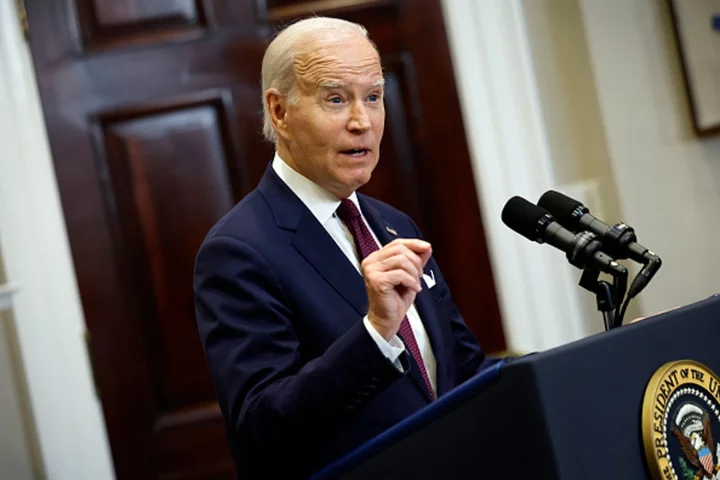
Biden condemns Supreme Court striking down affirmative action: ‘This is not a normal court’
President Joe Biden on Thursday said he “strongly, strongly disagree[d” with the Supreme Court’s decision to strike down the use of affirmative action programmes in college admissions decisions and condemned the six-justice majority that did so as “not a normal court”. Mr Biden’s harsh words for the highest court in the land came in response to a reporter’s query on whether the court was acting as a “rogue court,” just after he addressed the landmark decision in brief remarks before departing the White House for New York. Speaking from the Roosevelt Room in the West Wing, the president echoed the dissenting Justices, Sonia Sotomayor, Elena Kagan and Ketanji Brown Jackson, in his reaction to the ruling, which ends the long-standing precedent that allowed colleges and universities to use affirmative action to help establish a diverse group of accepted students. “Discrimination still exists in America. Today’s decision does not change that,” Mr Biden said in a brief press conference. He added: “I believe our colleges are stronger when they’re racially diverse. Our nation is stronger because we are tapping into the full range of talent in this nation. We cannot let this decision be the last word.” The rulings come from two consolidated cases, Students for Fair Admissions v University of North Carolina and Students for Fair Admissions v Harvard College. Both cases were brought forth by the anti-affirmative action organisation Students for Fair Admissions. That group, which is headed by conservative legal strategist Edward Blum, has for years made attempts to give the court’s GOP-appointed majority a chance to gut previous court precedents which have been used to justify limited use of race-based preferences in college admissions. While the court upheld such programmes in a decision nearly two decades, ago, the newly-emboldened conservative majority swept away any legal justification for them in Thursday’s opinions. In a 6-3 and 6-2 decision, the Court’s conservative majority sided with Students for Fair Admissions claiming the use of race-conscious admissions was a violation of the Equal Protection Clause of the 14th Amendment. Now, higher education institutions will no longer be allowed to consider race as a factor in admissions. Instead, students who wish to have their race or culture considered in their application will have to volunteer the information like in their personal essay. At the end of the press conference, Mr Biden responded to a question about the court’s decision to strike down a long-standing precedent: “This is not a normal Court.” Leaders from Harvard said in a letter that they would “comply” with the court’s decision but emphasised that “deep and transformative teaching, learning, and research depend upon a community comprising people of many backgrounds, perspectives, and lived experiences.” Mr Biden said he is directing the Department of Education to analyse best practices for high education institutions to create more inclusive and diverse student bodies without using race as a conscious factor in admissions and recruiting. The Harvard Black Students Association called the court’s decision, “detrimental”, adding that it “poses a significant threat to the future of the Black community on and beyond our campus.” “It is evident that the college application system cannot maintain holistic evaluation without taking into consideration how race profoundly influences our experiences, perspectives, and identities in multifaceted ways,” the Harvard Black Students Association wrote. Derrick Johnson, the president and CEO of the NAACP, said in a statement: “In a society still scarred by the wounds of racial disparities, the Supreme Court has displayed a willful ignorance of our reality.” Discussions around affirmative action have generated debate among Republicans and Democrats for years. Those in support of it believe it is necessary to create fair and equal opportunity for students of color because higher education institutions have failed at creating diverse student bodies. Those against affirmative action believe it puts other students, like white or Asian American students, at a disadvantage. Former president Donald Trump celebrated the ruling calling it “everyone was waiting for” in a post on Truth Social. “We’re going back to all merit-based – and that’s the way it should be!” Mr Trump wrote. Mr Trump appointed three of the six conservative Justices on the Court while serving as President of the United States – Justices Neil Gorsuch, Brett Kavanaugh and Amy Coney Barrett. Mr Trump’s former vice president, Mike Pence, also expressed support for the Court’s decision, writing on Twitter, “I am honored to have played a role in appointing three of the Justices that ensured today’s welcomed decision.” He added: “There is no place for discrimination based on race in the United States, and I am pleased that the Supreme Court has put an end to this egregious violation of civil and constitutional rights in admissions processes, which only served to perpetuate racism.” The ruling will likely have repercussions beyond higher education institutions, extending to elementary, middle and high schools as well as workplaces and more as it opens a door for challenges to racial diversity programs. Read More Justice Ketanji Brown Jackson delivers searing civil rights lesson in dissent to affirmative action ruling How the government that promised to ‘stop the boats’ has lost control of its immigration policy Clarence Thomas says he doesn’t have a ‘clue’ what diversity means as Supreme Court takes aim at affirmative action One year after the anti-abortion ruling, the White House keeps a spotlight on the issue
2023-06-30 02:16
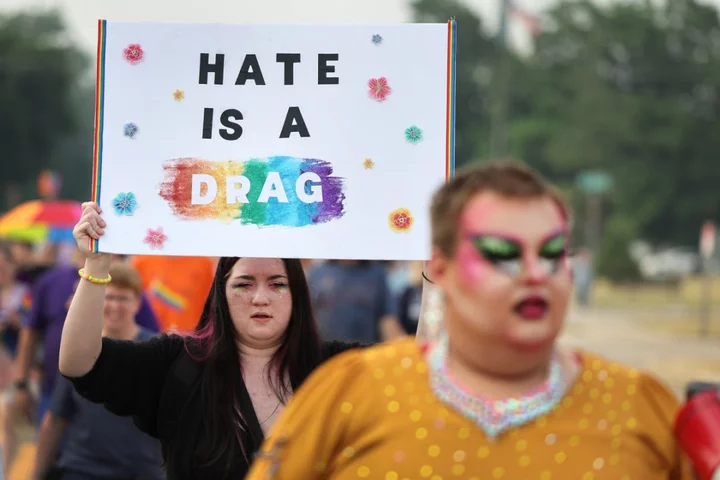
More than half of Americans have experienced online hate and harassment, report finds
More than half of all Americans have experienced online hate or harassment within their lifetimes, while reports of online abuse among teenagers and LGBT+ people have surged within the last year, according to an annual survey from a leading civil rights group. The Anti-Defamation League’s fifth annual survey charts a dramatic increase in reports of online hate and harassment among several groups over the last year, including 51 per cent of teenagers between ages 13 and 17 – an increase of 15 per cent from the same point last year. Forty-seven per cent of LGBT+ people, 38 per cent of Black people, and 38 per cent of Muslims have reported online hate and harassment over the last 12 months, according to the report, which calls on Congress, the White House and social media companies to implement stronger protections against online abuse. “We’re confronted with record levels of hate across the internet, hate that too often turns into real violence and danger in our communities,” according to a statement from ADL CEO Jonathan Greenblatt. “The time for talking, and for planning, is long over. It’s time to execute on the priorities set out by the White House and other policymakers, and it’s time for big tech companies to deliver on their promises to reduce hate online.” Reports of online abuse are particularly acute among transgender people; 76 per cent of trans respondents said they have been harassed online within their lifetimes, and more than half experienced such abuse within the previous 12 months – the most among any demographic included in the survey. “Due to the recent proliferation of extreme anti-transgender legislation and rhetoric, ADL sampled transgender individuals separately this year,” according to the report. By the end of May, state lawmakers had introduced more than 500 bills impacting LGBT+ people in 2023, including 220 bills specifically targeting trans and nonbinary Americans, according to an analysis from the Human Rights Campaign. In remarks at the White House earlier this month, President Joe Biden condemned the “totally, thoroughly unjustified and ugly” wave of legislation impacting LGBT+ Americans. A separate report from the ADL and GLAAD discovered more than 350 targeted threats against LGBT+ people within the last year, including online harassment as well as armed protests at drag performances, bomb scares against hospitals that provide gender-affirming healthcare, and other acts of violence, including a mass shooting inside a Colorado Springs LGBT+ nightclub. Incidents targeting drag performers and the people and venues that host them have accelerated across the US, with similar threats surfacing in the UK, according to a separate recent report from the Institute for Strategic Dialogue. The group collected 203 on- and offline threatening incidents within the last year. The ADL’s latest survey of 2,139 people was performed online with the ADL and YouGov from 7 March through 24 March. Read More More than 200 anti-drag attacks documented across US as nation leads global threats to LGBT+ events Ritchie Torres, the only openly gay Black man in Congress, on how he fights GOP ‘bullying’ of LGBT+ people Elon Musk promotes transphobic content as hate speech surges on his far-right platform White House rejects Lauren Boebert’s claim that antisemitism plan will be used ‘go after conservatives’
2023-06-29 00:55

Cambodian leader Hun Sen, a huge Facebook fan, says he is jumping ship to Telegram
Cambodian Prime Minister Hun Sen, a devoted and very active user of Facebook — on which he has posted everything from photos of his grandchildren to threats against his political enemies — said Wednesday that he will no longer upload to the platform and will instead depend on the Telegram app to get his message across. Telegram is a popular messaging app that also has a blogging tool called “channels.” In Russia and some of the neighboring countries, it is actively used both by government officials and opposition activists for communicating with mass audiences. Telegram played an important role in coordinating unprecedented anti-government protests in Belarus in 2020, and currently serves as a major source of news about Russia’s war in Ukraine. The 70-year-old year Hun Sen is listed as having 14 million Facebook followers, though critics have suggested a large number are merely “ghost” accounts purchased in bulk from so-called “click farms,” an assertion the long-serving prime minister has repeatedly denied. The Facebook accounts of Joe Biden and Donald Trump by comparison boast 11 million and 34 million followers, respectively, though the United States has about 20 times the population of Cambodia. Hun Sen officially launched his Facebook page on Sept. 20, 2015, after his fierce political rival, opposition leader Sam Rainsy, effectively demonstrated how it could be used to mobilize support. Hun Sen is noted as a canny and sometimes ruthless politician, and has since then managed to drive his rival into exile and neutralize all his challengers, even though Cambodia is a nominally democratic state. Hun Sen said he is giving up Facebook for Telegram because he believes the latter is more effective for communicating. In a Telegram post on Wednesday he said it will be easier for him to get his message out when he is traveling in other countries that officially ban Facebook use. China, the top ally of his government, is also the biggest country with a Facebook ban. Hun Sen has 855,000 followers so far on Telegram, where he appears to have started posting in mid-May. It is also possible that Hun Sen’s social media loyalty switch has to do with controversy over remarks he posted earlier this year on Facebook that in theory could see him get at least temporarily banned from the platform. As the country’s top leader for 38 years, he has earned a reputation for heated rhetoric, and in January, speaking at a road construction ceremony, he decried opposition politicians who accused his ruling Cambodian People’s Paty of stealing votes. “There are only two options. One is to use legal means and the other is to use a stick,” the prime minister said. “Either you face legal action in court, or I rally (the Cambodian) People’s Party people for a demonstration and beat you up.” His remarks were spoken on Facebook Live and kept online as a video. Perhaps because of heightened consciousness about the power of social media to inflame and trigger violence in such countries as India and Myanmar, and because the remarks were made ahead of a general election in Cambodia this July, complaints about his words were lodged with Facebook’s parent company, Meta. Facebook’s moderators declined to recommend action against Hun Sen, judging that his position as a national leader made his remarks newsworthy and therefore not subject to punishment despite their provocative nature. However, the case was forwarded in March to Meta’s Oversight Board, a group of independent experts that is empowered to render an overriding judgment that could limit Hun Sen’s Facebook activities. They may issue a decision in the next few weeks. The case is being closely watched as an indicator of where Facebook will draw the line in countries with volatile political situations. Hun Sen said his Facebook account will remain online but he will no longer actively post to it. He urged people looking for news from him to check YouTube and his Instagram account as well as Telegram, and said he has ordered his office to establish a TikTok account to allow him to communicate with his country’s youth.. ___ Peck reported from Bangkok. Dasha Litvinova contributed from Tallinn, Estonia. Read More Ukraine war’s heaviest fight rages in east - follow live Charity boss speaks out over ‘traumatic’ encounter with royal aide Cambodian lawmakers approve changes to election law that disqualify candidates who don't vote Trump’s latest defence in the classified documents case: ‘Bravado’ Trump gives ‘bravado’ defence for secret papers tape as he sues E Jean Carroll – live
2023-06-29 00:54
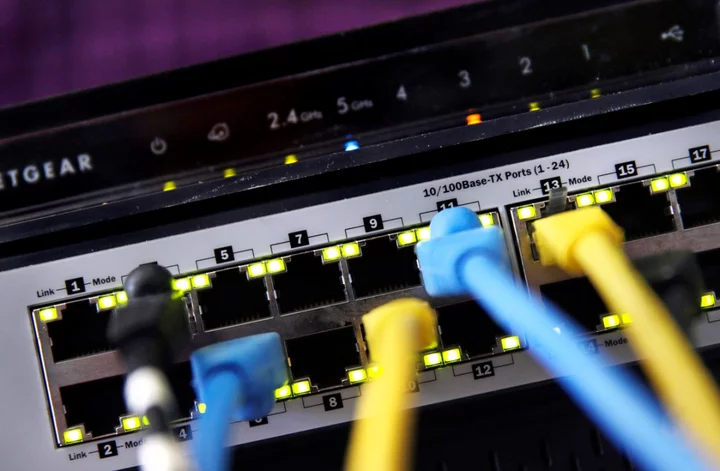
LOCALIZE IT: Biden announced billions of dollars to expand broadband. What's next?
EDITORS/NEWS DIRECTORS: The Biden Administration released details about the $42.5 billion cornerstone of its Internet for All initiative on Monday. The money, which state governments will eventually award broadband providers, has the chance to be transformative in communities with inadequate service or exorbitant costs. Funding amounts from the Broadband Equity, Access and Deployment (BEAD) program depended primarily on the number of unserved locations in each jurisdiction. Unserved locations are those that lack access to internet download speeds of at least 25 megabits per second download and upload speeds of 3 Mbps. Download speeds involve retrieving information from the internet, including streaming movies and TV. Upload speeds determine how fast information travels from a computer to the internet, like sending emails or publishing photos online. The federal government used the FCC’s National Broadband Map to identify the number of unserved locations in each jurisdiction. Before states can draw down on those funds, they must engage in a multi-step approval process with the federal government to ensure the money is deployed to the communities that need it the most. ___ AP’S LATEST COVERAGE Biden’s broadband plan aims to connect every home and business in U.S. by 2030. What’s next? High-speed internet is a necessity, President Biden says, pledging all US will have access by 2030 ___ VIEW YOUR STATE'S BEAD FUNDING ALLOTMENT AND PERCENT OF AREAS UNSERVED — The AP produced a dataset showing each state’s allotment in dollars and the percent of Broadband Serviceable Locations—homes and businesses where high-speed internet could be installed—that are estimated to be unserved, according to the latest version of the FCC National Broadband Map. ___ VIEW DETAILED BROADBAND MAPS AND FUNDING MAPS — The FCC National Broadband Map is an updating dataset that shows advertised internet speeds at the address level. Version 2 is the latest public iteration and was used to determine states’ BEAD allotments. The default view of the map shows residential service provided by all types of technology with download speeds of at least 25 Mbps and upload speeds of at least 3 Mbps. The federal government defines reliable service as that which is provided through wired or fixed wireless technologies. To view coverage provided by reliable technologies only, click the gear icon on the righthand side of the page. Under technologies, select “All Wired and Licensed Fixed Wireless.” In this menu, you can also choose to view coverage of businesses instead of residences and set different speed minimums. — Check out the FCC Broadband Funding map. This offers details on funding from some other federal broadband expansion programs. To view a breakdown of projects and funding in a given area, click the Funding Summary button (to drill down, make sure you're zoomed in to at least level 10, then click on individual hexagons for details). To view the percentage of areas unserved or unfunded, click the Location Summary button. To view maps by funding type, click on the different links below the Broadband Funding Summaries heading in the pop-up box. ___ VIEW OTHER RESOURCES — The National Telecommunications and Information Administration (NTIA) is administering the BEAD program. It is keeping track of which states have released initial proposals, which must be approved before states can begin the grant making process. Initial proposals are due by the end of the year and can be submitted in two volumes. On this page are also links to 5-year-plans, which lay out how states hope to achieve universal connectivity, and digital equity plans, covering how states aim to equip individuals with the skills and devices necessary to leverage internet access. You can sign up to receive email updates when new proposals and plans are released. States with initial proposals released: Louisiana (volume 1) Virginia (volume 1) States with 5-year plans released: Hawaii Maine Montana Ohio Utah Draft Digital Equity Plans: Louisiana Maine Montana Utah — Nonprofits, internet service providers and local and Tribal governments will eventually have the opportunity to assess their state’s determinations of which locations are eligible for funding and challenge those decisions. The NTIA has published draft guidance for how those challenge processes will run, and final guidance is expected soon. ___ QUESTIONS/REPORTING THREADS — What is your state’s allotment from BEAD? How have state and local officials reacted to this amount? Do they believe it will be enough to connect people who are still without access to reliable internet? — Which counties in your state are the most digitally distressed? Are there any demographic or socioeconomic similarities between these areas? Are they geographically consolidated or spread throughout the state? Do any counties with poor connectivity border counties that have good internet access? — Are there any topographic or climatic challenges, such as mountains and year-round cold weather, to laying down fiber in your state? How do state officials plan to overcome these challenges? Are there any remote counties or towns? — What is the landscape of existing broadband aid in your state? Broadband expansion projects from other federal programs, including the USDA’s ReConnect program and the American Rescue Plan, are ongoing. Additionally, states run their own grant programs aimed at closing the digital divide. How are these projects going? How have completed projects affected the lives of people in that area? How do these existing projects work with your state's plans to use BEAD funding? ___ READ ADDITIONAL AP COVERAGE $930 million in grants announced in Biden’s effort to expand internet access to every home in the US States contend with short timeline to correct broadband map ___ Localize It is an occasional feature produced by The Associated Press for its customers’ use. Questions can be directed to Katie Oyan at koyan@ap.org. Read More Ukraine war’s heaviest fight rages in east - follow live Charity boss speaks out over ‘traumatic’ encounter with royal aide UN urges Israel and Palestinians to halt West Bank violence in statement backed by US and Russia EPA retreats on Louisiana investigations that alleged Blacks lived amid higher cancer risk US push to lower wildfire risk across the West stumbles in places
2023-06-28 23:50
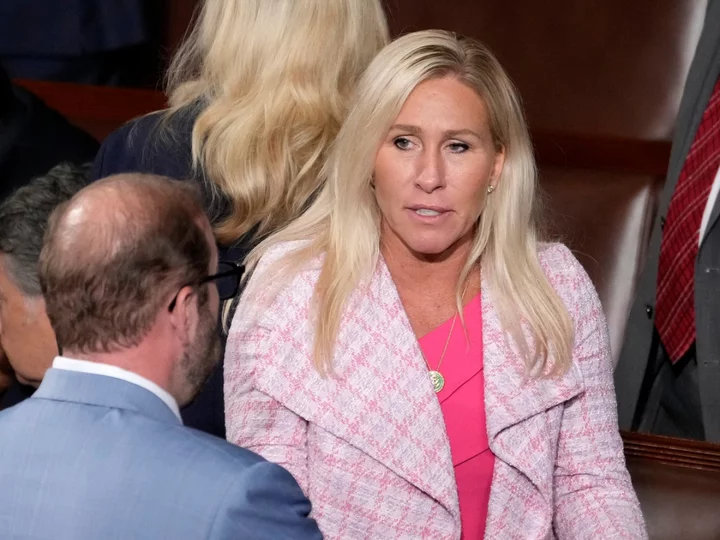
Marjorie Taylor Greene mocked for bizarre tweet boasting about good health and claiming her TV is spying on her
Georgia Republican Marjorie Taylor Greene posted a lengthy tweet bragging about her health and exercise regimen after claiming that her TV in her DC residence appears to be spying on her. On Sunday morning, Ms Greene wrote: “Last night in my DC residence, the television turned on by itself and the screen showed someone’s laptop trying to connect to the TV.” “Just for the record: I’m very happy. I’m also very healthy and eat well and exercise a lot. I don’t smoke and never have. I don’t take any medications. I am not vaccinated. So I’m not concerned about blood clots, heart conditions, strokes, or anything else. Nor do I have anything to hide,” Ms Greene added, possibly in a reference to the novel 1984, where residents are spied on by the state via their TVs. “I just love my country and the people and know how much they’ve been screwed over by the corrupt people in our government and I’m not willing to be quiet about it, or willing to go along with it,” she concluded, before adding a link to a CBS News story about Smart TVs possibly spying on their users, according to the FBI. The agency issued a warning in late 2019 saying that Smart TVs could be hacked and access could be gained to a home’s computer network. The FBI noted that while Smart TVs are connected to the Internet, they’re often much less secure than computers and smartphones. This means that cybercriminals may use the TVs to access home routers, TechCrunch noted at the time. “Beyond the risk that your TV manufacturer and app developers may be listening and watching you, that television can also be a gateway for hackers to come into your home,” the FBI warning said at the time. Ms Greene was quickly mocked by Twitter users for seemingly suggesting that the government was spying on her via her TV. “Yeah every time someone tries to access my WiFi I know that means they’re coming to kill me,” historian Kevin Kruse tweeted. “Was the deep state trying to watch your tv shows?” Josh Marshall of Talking Points Memo tweeted. “Am I the only one who doesn’t know what the tv screen looks like when it shows ‘someone’s laptop trying to connect to the TV.’ I wanted to be prepared for when I have my first psychotic break.” “It happens all the time in apt buildings. Someone chooses the wrong tv. You say deny and move on,” Greg Gadren responded. “Do people not know about smart tvs? I’ve accidentally tried to connect to other people’s tv in my apartment complex. It doesn’t mean I’m trying to spy, nor does it mean anything weird is happening,” one account holder said. “You should IMPEACH THE TV,” one Twitter user said. “What is apple play for $200.” “Have you considered an exorcism?” another account holder said. “Are they in the room with us right now?” California Democrat Eric Swalwell joked. “I feel like a neighbor accidentally trying to Airplay to your TV isn’t an assassination attempt?” Hayden Clarkin said. “I am laughing so f****** hard. A neighbor trying to screen share something accidentally clicked ‘Samsung-8237’ instead of ‘Samsung-1490’ and this delusional nut job is issuing a final will and testament,” Caleb Hearon said. Read More Speaker McCarthy supports expunging Trump's impeachments over Ukraine and Jan. 6 Arizona election denier Kari Lake ‘couch-surfing like a bum’ at Mar-a-Lago, ex-Trump lawyer says Lauren Boebert reveals she’s officially a grandmother as she avoids question about Marjorie Taylor Greene spat Trump allies in Congress seek to expunge impeachments Lauren Boebert reveals she’s officially a grandmother at age 36 Marjorie Taylor Greene calls Lauren Boebert a ‘little b****’ on House floor
2023-06-26 21:53

Online gamblers raked in thousands on bets against the Titanic sub crew’s survival
Online gamblers bet hundreds of thousands of dollars on whether the submarine that went missing on a recent expedition to the Titanic, in what online critics called a “dystopian” use of digital finance. Since Wednesday, people wagered at least $300,000 on the fate of the vehicle using the crypto platform Polymarket, Mother Jones reports. On the site, betters buy and sell shares on the outcomes of events using cryptocurrency, and can redeem their shares for $1 each if their guesses are correct. Follow the latest updates on the missing Titanic submarine here “For the purposes of this market, the vessel need not have been rescued or physically recovered to be considered ‘found,’” reads the description page for the submarine bets. “If pieces are located, but not the cabin which contains the vessel’s passengers, that will not suffice for this market to resolve to ‘Yes.’” One user, asking only to be identified by his first name, Rich, told Mother Jones he made around $3,250 betting. He argued what he was doing was morally defensible because unlike the regular stock market, it had no impact on the fate of the entity being wagered upon. “My answer would be that markets are fundamentally immoral. There’s no ethical consumption under capitalism,” Rich said. Others weren’t so sure. Social media users racked up thousands of likes criticising such gamblers. “Actually insane,” one commenter wrote. “Imagine making money off of if someone is gonna die or not.” Polymarket defended its offerings on the submarine, arguing that it was a neutral way of calculating the likelihood of a rescue. “If the families were privy to Polymarket, they could use the market as a way to obtain the real-time, unbiased probability of the submarine being recovered,” the company said in an email to Gizmodo. “That is a far more valuable service to them than sensationalist media coverage: with our markets at least they understand the true probabilities.” Bookmakers take bets on nearly everything, from sports to sex tapes, but the industry does have some lines regarding poor taste. According to Betting Gods, a gambling industry tip site, most major bookmakers refused to take bets regarding the death of Queen Elizabeth. “Major bookmakers won’t bet on the Queen dying as it would offend most of its regular customers. Whether they all agree with Britain having a royal family or not, most people would prefer to bet on a variety of other things such as sports,” the site wrote in an article. “When asked the question of why bookmakers won’t bet on what age the queen will die, the spokespeople of all the major bookmakers were unanimous in saying that it was important that people understand where the parameters of bad taste bets can’t be crossed.” Read More US launches prosecutions of Chinese companies on charges of trafficking fentanyl ingredients Titanic sub latest - Coast Guard makes stunning admission about ‘explosion’ when submersible lost contact OceanGate CEO said he was ‘personally insulted’ by ‘baseless cries’ about Titanic sub’s deadly safety flaws Federal court halts ‘suppressive’ Florida drag ban Florida's law targeting drag shows is on hold under federal judge's order Recovery could cost millions as Coast Guard stunningly admits submersible ‘explosion’
2023-06-24 07:46

Elon Musk sparks outrage with threat to ban ‘cisgender’ as a ‘slur’ on Twitter
Twitter CEO Elon Musk has apparently decided that "cis" and "cisgender" will now be considered a slur on the social media platform. "Cisgender" typically refers to individuals whose gender identity matches their birth sex. If an individual is born male and has a male gender identity then they would be considered "cisgender." The proclamation was made in the replies of James Esses, an Irish right-wing media figure, who was complaining that commenters on social media were calling him a "cissy." "Yesterday, after posting a Tweet saying that I reject the word ‘cis’ and don’t wish to be called it, I receive a slew of messages from trans activists calling me ‘cissy’ and telling me that I am ‘cis’ 'whether or not I like it,'" he wrote. "Just imagine if the roles were reversed." Mr Musk responded with an announcement that "repeated, targeted harassment against any account will cause the harassing accounts to receive, at minimum, temporary suspensions." Mr Musk then took it a step further. "The words 'cis' or 'cisgender' are considered slurs on this platform," he wrote, prompting backlash on the platform. NYT bestselling author Seth Abramson doubted that Mr Musk knows what the word means. “I’m 102.3% sure Elon has no idea what ‘cis’ or ‘cisgender’ mean, either connotatively or denotatively or etymologically,” he wrote. “Threatening to suspend users on your ‘free speech’ platform because they uttered a word you don’t understand but fear emasculates you is quite the fascist flex.” Joe Walsh, a conservative commentator, criticised Mr Musk from the right. “‘Cis’ & ‘cisgender’ will be considered slurs on this platform? Look, it’s his company, he can do whatever he wants, but the truth is that @elonmusk is fundamentally a dishonest person and a coward,” Mr Walsh wrote. “He says he believes in free speech, but he doesn’t really believe in free speech. He’s pushing an agenda, a right wing agenda, but he doesn’t have the balls to admit that. Elon is too afraid to be honest with his intentions. So he lies and says he’s for free speech. But you can’t say ‘cisgender.’ No, Elon is just like most everyone else. He’s pushing an agenda. He just lacks the honesty & the courage to admit it.” It’s not the first time Mr Musk has expressed his disdain for language relating to gender identity. Last July he tweeted that “pronouns suck” — suggesting he either dislikes gender identity or just the English language in general — and later that year insisted that he was not transpohobic. “I absolutely support trans, but all these pronouns are an aesthetic nightmare,” Mr Musk, creator of the Cybertruck, argued. However, in defending his dislike of “cis” and “cisgender,” Mr Musk leaned on a decades old bigoted ideas that LGBT communities and ideas are deeply infected with pedophilia. “The contemptible creep that manufactured the term ‘cis’ has serious problems. Ignore him,” Mr Musk wrote, referencing a right-wing conspiracy theory that the term “cisgender” was coined by a paedophile doctor in the 1990s. However, cis— with “cis” being the Latin opposite to “trans” — has been used as a dichotomic descriptor since at least the early 20th century. Read More Musk vows to bring Tesla to India ‘as soon as possible’ after meeting Modi Elon Musk stays mum on Titanic submarine disappearance despite Starlink connection Elon Musk and Joe Rogan challenge Covid vaccine scientist to ‘debate’ anti-vaxxer Robert F Kennedy Jr Elon Musk stays mum on Titanic submarine disappearance despite Starlink connection India’s Modi to meet Elon Musk during US state visit Vaccine scientist hounded by conspiracists after Joe Rogan targeted him on Twitter
2023-06-22 01:27
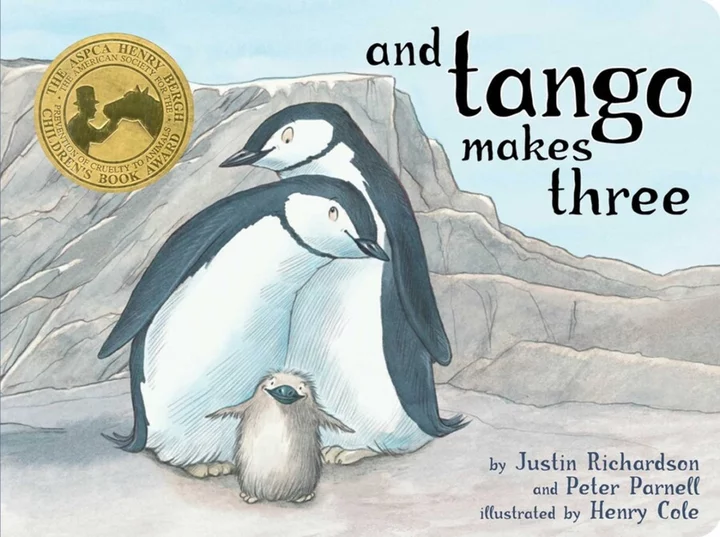
‘And Tango Makes Three’ penguin picture book authors sue Florida over ban under ‘Don’t Say Gay’ law
A group of Florida students and the authors of an award-winning children’s picture book about the true story of a penguin family with two fathers have argued that a Florida school district unconstitutionally restricted access to the book under what opponents have called the state’s “Don’t Say Gay” law. A lawsuit filed in federal court on 20 June argues that the Lake County school district’s decision to pull And Tango Makes Three “cited no legitimate pedagogical reason for its decision” and was restricted only for “illegitimate, narrowly partisan and political reasons.” Last year, Lake County officials announced that the title was “administratively removed due to content regarding sexual orientation/gender identification” prohibited under the “Parental Rights in Education Act,” what critics have called the “Don’t Say Gay” law. That measure, signed into law by Governor Ron DeSantis last year, broadly prohibits “classroom instruction” on issues related to “sexual orientation or gender identity” in kindergarten through third grade” or “in a manner that is not age appropriate or developmentally appropriate for students in accordance with state standards” in other grades. Mr DeSantis signed a measure this year that explicitly expands the law to cover all school grades. Opponents have warned its broad scope could effectively block discussion of LGBT+ people, history and events from state schools, and be weaponised against students, staff and their families under threat from potential lawsuits against school districts over perceived violations. The lawsuit from the book’s authors Justin Richardson and Peter Parnell and the families of several young students argues that such restrictions violate First Amendment protections, including the authors’ right to freedom of expression and students’ rights to receive information. And Tango Makes Three “tells a true and heartwarming story, and it teaches students about animal behavior, adoption, diversity among family structures, and responsible family values,” the lawsuit states. “The authors wrote Tango to spread a message of tolerance and equal treatment. They have a sincere and strongly held desire to ensure that Tango is available to children learning about animal behavior, adoption, and family structures, whether similar to or different from their own – and the student plaintiffs wish to read Tango to learn about those very subjects,” the plaintiffs wrote. The book was listed among free expression group PEN America’s most-banned picture books of the last school year. Last year, a record high of more than 1,200 attempts to remove books from schools and libraries were reported to the American Library Association. There were at least 1,477 attempts to ban 874 individual book titles within the first half of the 2022-2023 school year, according to PEN America. The figures mark a nearly 30 per cent spike from book challenges over the previous year. Book ban attempts have largely targeted books by and about LGBT+ people, titles written by or involving people of colour, or materials featuring honest discussions of race and racism, according to PEN America. Mr DeSantis and his administration have repeatedly rejected characterising such restrictions as “book bans” and have accused media outlets of manufacturing a “hoax” and a “fake narrative” surrounding them. The state has been at the centre of book challenges and legal battles over school and library materials as the DeSantis administration implements a sweeping agenda targeting public education and lessons and speech he deems objectionable. PEN American and Penguin Random House, one of the largest book publishers in the world, and several prominent authors and families have also sued a separate school district and school board in Florida’s Escambia County. A lawsuit filed in US District Court last month argues that school officials have pursued an “ideologically driven campaign to push certain ideas out of schools” against the recommendation of experts. “This disregard for professional guidance underscores that the agendas underlying the removals are ideological and political, not pedagogical,” the lawsuit states. The Independent has requested comment from the state’s Department of Education. Read More A zoo, Black History event and university funding: Ron DeSantis under fire after vetoing local funding because lawmakers didn’t endorse him DeSantis wants to model America after Florida. Civil rights groups are sounding the alarm on his ‘hostile’ agenda The school librarian in the middle of Louisiana’s war on libraries ‘They were trying to erase us’: Inside a Texas town’s chilling effort to ban LGBT+ books Biden condemns ‘hysterical’ threats to LGBT+ Americans as White House pushes back on book bans Florida mom who tried to ban Amanda Gorman’s book has ties to far-right groups
2023-06-21 04:17
